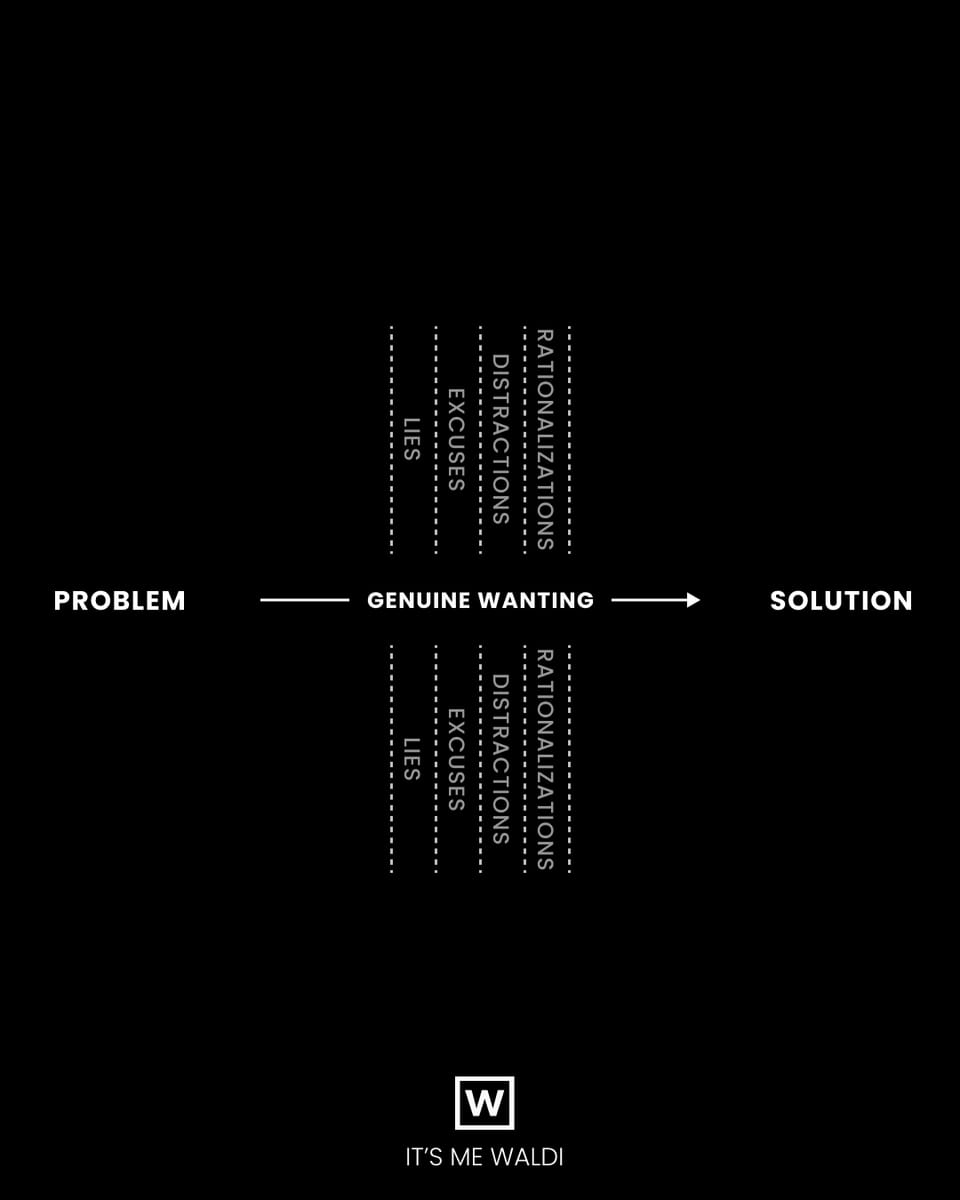Genuine Wanting: The Invisible Key to Unlock Your Problems

Even if you're truthful with yourself and aware of one of your problems, you might still not solve it.
One reason for this is that you don't genuinely want to solve it.
If that's the case, no amount of information, advice, or money will solve your problem.
To solve a problem, you first have to genuinely want to solve it.
Why You'll Fail If You Don't Want to Genuine Solve Your Problem
If you don't want to genuinely solve your problem, you'll find ways to dismiss it, ignore it, or avoid it. Your unconscious and conscious minds will justify your dismissal, ignorance, and avoidance. They'll exploit the grey area between you and your problems to justify your inaction. They'll succeed, because if you don't want to solve a problem, you'll always find an excuse for it.
If you try to solve a problem without genuinely wanting to, you will fail.
You won't give your full effort, won't use your full creativity, and won't draw on all your available resources. Consequently, your attempts at solving the problem will be so half-hearted that they'll never work. As a result, you'll only waste your time, energy and resources in an effort that was doomed from the start.
Now, you might ask: "Why would I care?"
Here's what I'd answer:
Your doomed attempts have dire consequences.
Wasting your efforts gives your problem room, time, and permission to grow. Remember, problems grow on their own. You don't have to do anything particularly bad. Doing nothing is enough. When your problem grows it becomes harder to solve and if it grows long enough it can even destroy your life. Just think of all the people whose addictions ruined their lives.
Additionally, your unsolved problems burden your conscience.
No matter how hard you try, you can't deceive your conscience into forgetting or denying a problem. It won't forget about it. This is why you have trouble falling asleep or suffer from recurring nightmares. Your conscience uses this time to remind you of your problem. Avoiding your problems can produce a whole host of other issues, too. Chronic pain, stress, and anxiety don't seem related to avoidance but often result from it.
Lastly, living with unsolved problems limits your potential.
Every unsolved problem creates barriers in your life. When you pursue your goals or your your life vision these barriers become obstacles. They'll block paths you could otherwise take and constrain your options. Thus, they limit your potential and cap your growth.
Let's say you want to get in shape but fear what other people will think of you when you go to the gym. Every possibility to get in shape that exposes you to the judgment of others is off-limits. These constraints limit which exercises you can do to get in shape. They narrow your options for getting in shape and thus your potential for what you can get out of life.
And this is just one example, of how your unsolved problems cap your potential.
Do you see now, how ingenuinly trying to solve your problems sabotages your life?
The Benefits of Genuinely Wanting to Solve Your Problems
Now, imagine how much easier and better your life would be if you'd genuinely want to solve your problems.
Instead of avoiding, dismissing, or distracting from your problem, you'd try to understand it. You'd take responsibility for it and solve it.
Instead of giving your problem time to grow, spread, and take you out, you'd contain, limit, and solve it.
Instead of wasting your time, energy, and resources with futile attempts, you'd try to solve it.
Instead of burdening your conscience with more and more problems, you'd free it of its baggage.
Instead of circumventing the barriers of unsolved problems, you'd benefit from abundant options.
Is that too little payoff for genuinely wanting to solve your problem?
Conclusion: The Power and Perils of Genuine Desire for Problem Solving
Now, realizing how important it is to gennuinely want to solve your problems raises a question:
How can you become genuinely willing to solve them?
This is such an extensive and important topic that I have multiple letters on it planned already. Each will explore a different way in which you can become more willing to solve your problems.
For now, commit to truth, become aware of your problems, and then try to see if you're genuinely willing to solve them.
If you are, you're ready to respond to them.
If you aren't you can read my letter to discover one method that might help.
Again, I'll write more in the coming weeks and months. If you want to read them, you can enter your e-mail below.
Read you then.
Waldi
